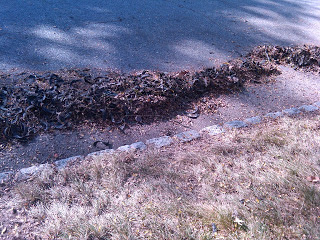 |
| Another winter, another brown creeper (Margo D. Beller) |
-- Henry David Thoreau, Journal, Nov. 26, 1859
It is almost the same day 159 years later and the brown creeper I am watching is doing the exact same thing Thoreau saw in his woods, living up to its name by creeping deliberately up a stout tree.
I am in a small park in my town, carefully walking in the frozen slush, and I have stopped to watch some robins. Then I see movement against the brown-gray of the tree and there is the creeper, almost perfectly camouflaged, the movement of its head showing the white below and thus giving it away.
I stand and watch it a long time as it carefully climbs the tree, sticking its long, decurved bill into every crevice. It makes a faint sound that, because I only seem to find these birds in late autumn into winter, is not as familiar to me as that of the nearby white-breasted nuthatch, whose call sounds like hank.
Creepers, according to the bird people at Cornell, build their nests behind peeling tree bark. Is this bird looking for food or a nest site? The range map shows this bird is a year-round resident of northern New Jersey. They mainly eat insects but will also come to suet feeders. I've never had one there.
That is not the case with the white-breasted nuthatch, which I see at my sunflower seed feeders every day they are out. This bird is not quiet, shy or easily missed like the creeper, it is a pugnacious little bird that stands out. It will fly to the house feeder, cling to the roof, dip its head down and grab a seed even as a larger bird such as a cardinal is sitting inside and eating. When a nuthatch flies in, the house finches scatter, as do most of the smaller birds.
I went to the oaks. Heard there a nuthatch's faint vibrating tut-tut, somewhat even like croaking of frogs, as it made its way up the oak bark and turned head down to peck. Anon it answered its mate with a gnah, gnah.
-- Thoreau, Journal, April 6, 1856
 |
| White-breasted nuthatch (Margo D. Beller) |
The white-breasted nuthatch, despite having a whole tree at its disposal, now flies at the creeper to force it away so it can examine that spot. The creeper flies to the other side of the trunk, where I can no longer see it. Another nuthatch, on a nearby tree, calls and this one answers.
Unlike the creeper, the only one of its type, there are three types of eastern nuthatches, the white-breasted, the red-breasted and the brown-headed. (I have seen all three.) The brown-headed is found as far north as Delaware, although occasionally one hitches a ride on the Cape May-Lewes ferry and shows up to thrill birders in New Jersey. Its call is high-pitched and squeaky, more like a mouse than a bird.
The red-breasted is a bird of northern, piney woods but in some years, such as this one, it can't find enough food and so moves south. This phenomenon is called irruption, and we have them most winters although the birds flying south may vary. (One year it was snowy owls.)
Besides the red breast, this bird is easily identified by the black line that runs through the eye. Its call is another pitch entirely from the white-breasted nuthatch and usually faster. This year I saw several in the larches on the outskirts of a dog park near me for one bright morning, but it was only that one day.
If I am lucky, a red-breasted nuthatch will come to my feeder, too, but usually it is quickly chased off by the slightly larger white-breasted. That has been the case so far this season - a blink-and-you'll-miss-it visit by a red-breasted nuthatch that was just figuring out how to take a seed when it was chased off by the white-breasted. I hope it got a chance to come back and get a seed or two before heading for a pine forest.
 |
| White-breasted nuthatch about to force off a titmouse. (Margo D. Beller) |









